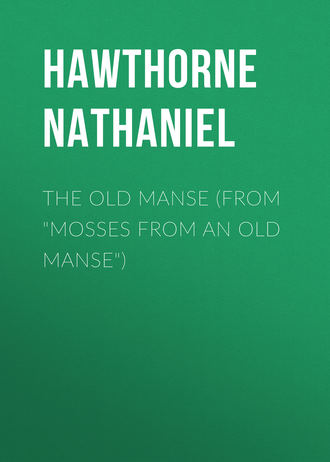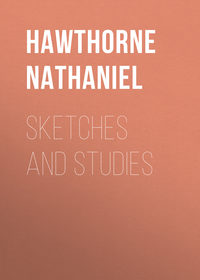
The Old Manse (From "Mosses from an Old Manse")
Were I to adopt a pet idea as so many people do, and fondle it in my embraces to the exclusion of all others, it would be, that the great want which mankind labors under at this present period is sleep. The world should recline its vast head on the first convenient pillow and take an age-long nap. It has gone distracted through a morbid activity, and, while preternaturally wide awake, is nevertheless tormented by visions that seem real to it now, but would assume their true aspect and character were all things once set right by an interval of sound repose. This is the only method of getting rid of old delusions and avoiding new ones; of regenerating our race, so that it might in due time awake as an infant out of dewy slumber; of restoring to us the simple perception of what is right and the single-hearted desire to achieve it, both of which have long been lost in consequence of this weary activity of brain and torpor or passion of the heart that now afflict the universe. Stimulants, the only mode of treatment hitherto attempted, cannot quell the disease; they do but heighten the delirium.
Let not the above paragraph ever be quoted against the author; for, though tinctured with its modicum of truth, it is the result and expression of what he knew, while he was writing, to be but a distorted survey of the state and prospects of mankind. There were circumstances around me which made it difficult to view the world precisely as it exists; for, severe and sober as was the Old Manse, it was necessary to go but a little way beyond its threshold before meeting with stranger moral shapes of men than might have been encountered elsewhere in a circuit of a thousand miles.
These hobgoblins of flesh and blood were attracted thither by the widespreading influence of a great original thinker, who had his earthly abode at the opposite extremity of our village. His mind acted upon other minds of a certain constitution with wonderful magnetism, and drew many men upon long pilgrimages to speak with him face to face. Young visionaries – to whom just so much of insight had been imparted as to make life all a labyrinth around them – came to seek the clew that should guide them out of their self-involved bewilderment. Gray-headed theorists – whose systems, at first air, had finally imprisoned them in an iron framework – travelled painfully to his door, not to ask deliverance, but to invite the free spirit into their own thraldom. People that had lighted on a new thought or a thought that they fancied new, came to Emerson, as the finder of a glittering gem hastens to a lapidary, to ascertain its quality and value. Uncertain, troubled, earnest wanderers through the midnight of the moral world beheld his intellectual fire as a beacon burning on a hill-top, and, climbing the difficult ascent, looked forth into the surrounding obscurity more hopefully than hitherto. The light revealed objects unseen before, – mountains, gleaming lakes, glimpses of a creation among the chaos; but also, as was unavoidable, it attracted bats and owls and the whole host of night birds, which flapped their dusky wings against the gazer's eyes, and sometimes were mistaken for fowls of angelic feather. Such delusions always hover nigh whenever a beacon-fire of truth is kindled.
For myself, there bad been epochs of my life when I, too, might have asked of this prophet the master word that should solve me the riddle of the universe; but now, being happy, I felt as if there were no question to be put, and therefore admired Emerson as a poet, of deep beauty and austere tenderness, but sought nothing from him as a philosopher. It was good, nevertheless, to meet him in the woodpaths, or sometimes in our avenue, with that pure, intellectual gleam diffused about his presence like the garment of a shining one; and be, so quiet, so simple, so without pretension, encountering each man alive as if expecting to receive more than he could impart. And, in truth, the heart of many an ordinary man had, perchance, inscriptions which he could not read. But it was impossible to dwell in his vicinity without inhaling more or less the mountain atmosphere of his lofty thought, which, in the brains of some people, wrought a singular giddiness, – new truth being as heady as new wine. Never was a poor little country village infested with such a variety of queer, strangely dressed, oddly behaved mortals, most of whom took upon themselves to be important agents of the world's destiny, yet were simply bores of a very intense water. Such, I imagine, is the invariable character of persons who crowd so closely about an original thinker as to draw in his unuttered breath and thus become imbued with a false originality. This triteness of novelty is enough to make any man of common-sense blaspheme at all ideas of less than a century's standing, and pray that the world may be petrified and rendered immovable in precisely the worst moral and physical state that it ever yet arrived at, rather than be benefited by such schemes of such philosophers.
And now I begin to feel – and perhaps should have sooner felt – that we have talked enough of the Old Manse. Mine honored reader, it may be, will vilify the poor author as an egotist for babbling through so many pages about a mossgrown country parsonage, and his life within its walls, and on the river, and in the woods, and the influences that wrought upon him from all these sources. My conscience, however, does not reproach me with betraying anything too sacredly individual to be revealed by a human spirit to its brother or sister spirit. How narrow-how shallow and scanty too – is the stream of thought that has been flowing from my pen, compared with the broad tide of dim emotions, ideas, and associations which swell around me from that portion of my existence! How little have I told! and of that little, how almost nothing is even tinctured with any quality that makes it exclusively my own! Has the reader gone wandering, hand in hand with me, through the inner passages of my being? and have we groped together into all its chambers and examined their treasures or their rubbish? Not so. We have been standing on the greensward, but just within the cavern's mouth, where the common sunshine is free to penetrate, and where every footstep is therefore free to come. I have appealed to no sentiment or sensibilities save such as are diffused among us all. So far as I am a man of really individual attributes I veil my face; nor am I, nor have I ever been, one of those supremely hospitable people who serve up their own hearts, delicately fried, with brain sauce, as a tidbit for their beloved public.
Glancing back over what I have written, it seems but the scattered reminiscences of a single summer. In fairyland there is no measurement of time; and, in a spot so sheltered from the turmoil of life's ocean, three years hastened away with a noiseless flight, as the breezy sunshine chases the cloud-shadows across the depths of a still valley. Now came hints, growing more and more distinct, that the owner of the old house was pining for his native air. Carpenters next, appeared, making a tremendous racket among the outbuildings, strewing the green grass with pine shavings and chips of chestnut joists, and vexing the whole antiquity of the place with their discordant renovations. Soon, moreover, they divested our abode of the veil of woodbine which had crept over a large portion of its southern face. All the aged mosses were cleared unsparingly away; and there were horrible whispers about brushing up the external walls with a coat of paint, – a purpose as little to my taste as might be that of rouging the venerable cheeks of one's grandmother. But the hand that renovates is always more sacrilegious than that which destroys. In fine, we gathered up our household goods, drank a farewell cup of tea in our pleasant little breakfast-room, – delicately fragrant tea, an unpurchasable luxury, one of the many angel gifts that had fallen like dew upon us, – and passed forth between the tall stone gate-posts as uncertain as the wandering Arabs where our tent might next be pitched. Providence took me by the hand, and – an oddity of dispensation which, I trust, there is no irreverence in smiling at – has led me, as the newspapers announce while I am writing, from the Old Manse into a custom-house. As a story-teller, I have often contrived strange vicissitudes for my imaginary personages, but none like this.
The treasure of intellectual gold which I hoped to find in our secluded dwelling had never come to light. No profound treatise of ethics, no philosophic history, no novel even, that could stand unsupported on its edges. All that I had to show, as a man of letters, were these, few tales and essays, which had blossomed out like flowers in the calm summer of my heart and mind. Save editing (an easy task) the journal of my friend of many years, the African Cruiser, I had done nothing else. With these idle weeds and withering blossoms I have intermixed some that were produced long ago, – old, faded things, reminding me of flowers pressed between the leaves of a book, – and now offer the bouquet, such as it is, to any whom it may please. These fitful sketches, with so little of external life about them, yet claiming no profundity of purpose, – so reserved, even while they sometimes seem so frank, – often but half in earnest, and never, even when most so, expressing satisfactorily the thoughts which they profess to image, – such trifles, I truly feel, afford no solid basis for a literary reputation. Nevertheless, the public – if my limited number of readers, whom I venture to regard rather as a circle of friends, may be termed a public – will receive them the more kindly, as the last offering, the last collection of this nature which it is my purpose ever to put forth. Unless I could do better, I have done enough in this kind. For myself the book will always retain one charm, – as reminding me of the river, with its delightful solitudes, and of the avenue, the garden, and the orchard, and especially the dear Old Manse, with the little study on its western side, and the sunshine glimmering through the willow branches while I wrote.
Let the reader, if he will do me so much honor, imagine himself my guest, and that, having seen whatever may be worthy of notice within and about the Old Manse, he has finally been ushered into my study. There, after seating him in an antique elbow-chair, an heirloom of the house, I take forth a roll of manuscript and entreat his attention to the following tales, – an act of personal inhospitality, however, which I never was guilty of, nor ever will be, even to my worst enemy.









